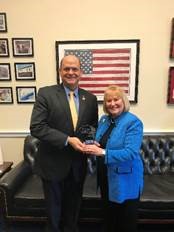What’s Happening in Washington
Election Aftermath – Congress returned to Capitol Hill to begin the post-election lame duck session, a laundry list of unfinished business awaits, including seven remaining fiscal 2019 spending measures. While leaders of both parties remain hopeful, political jostling could grind the processes to a halt and force another shutdown showdown just in time for the holidays.
On top of unfinished spending legislation, Congress must juggle a handful of crucial deadlines on must-pass pieces of legislation, including the farm bill, Violence Against Women Act, Pandemic All Hazards Preparedness Act, and expiring tax credits, as well as emergency disaster relief for recent wildfires and hurricanes. In between, each party is having leadership elections for the new 116th Congress, which have become more contentious in the House of Representatives. Now that the Democrats have regained majority in the House, a group of House Democrats are planning to release a letter claiming they’ve gathered enough support to deny Rep. Nancy Pelosi the 218 votes she’ll need on the House floor to win back the speakership. The vote is expected to be held on November 28.
Fetal Tissue Research Debate – The Department of Health & Human Services (HHS) has announced it will review the need for fetal tissue research. Scientists who use fetal tissue have been invited to defend their work at a November 16 HHS listening session on the subject. Assistant Secretary for Health Brett Giroir is leading the HHS review and is expected to eventually issue recommendations on the agency’s funding of fetal tissue research. The review has advocates concerned that the agency is putting religious beliefs ahead of medical research. See our recent letter supporting continued federal funding of fetal tissue research conducted in accordance with current federal rules.
What We Are Working On
Diabetes Awareness Month:
- Diabetes Champion Awards – This week we presented Diabetes Champion Awards to the Co-Chairs of the House Diabetes Caucus, Representatives Diana DeGette (D-CO) and Tom Reed (R-NY) and Senate Co-Chair Susan Collins (R-ME). We previously visited with Senate Co-Chair Jeanne Shaheen (D-NH). The four Co-Chairs are being recognized for their exemplary work improving diabetes care. This includes successfully obtaining $600 million for the Special Diabetes Program. More details here.
- Diabetes Self-Management Training Legislation – Bipartisan legislation has been introduced in the House of Representatives and the Senate that would expand access to diabetes self-management training (DSMT). We support this bipartisan legislation and encourage our members to join our campaign and urge Members of Congress to co-sponsor the Expanding Access to Diabetes Self-Management Training Act of 2018.
- Twitter Chat – The Society is hosted a twitter chat to discuss diabetes technology. Society member Dr. Jennifer Sherr, and our Chief Professional and Clinical Affairs Officer Dr. Robert Lash moderated the chat, featuring a discussion about what diabetes technology is available now, where diabetes technology could be going in the future, and how to manage the transition from pediatric to adult diabetes care. The Twitter Chat racked up more than 2.3 million impressions. Invited guests from AADE, diaTribe (influential diabetes blog Close Concerns’ patient publication), Medscape, and HHN partner Health Sherpas all shared their viewpoints and content.
Physician Payment – The Centers for Medicare & Medicaid Services (CMS) recently announced significant changes to evaluation and management (E/M) code payment and documentation. While these changes are not scheduled to be implemented until January 1, 2021, CMS estimates they will result in a 2% cut in E/M reimbursement for endocrinology. Under the new requirements, level 2-4 E/M codes will be collapsed and paid at a single rate. See our comments to CMS here. We will host a special webinar December 6th at noon East Coast time to share more details and how these changes will impact physician practices. Stay tuned for more details on how to register for our webinar.
BRAIN Initiative – We submitted comments in response to an NIH Request for Information on the Brain Research through Advancing Innovative Neurotechnologies (BRAIN) Scientific Vision. Our comments highlighted important information about the role of hormones in understanding the structure and function of the brain and encouraged the BRAIN Initiative working group to prioritize endocrinology in research areas supported by the Scientific Vision.



